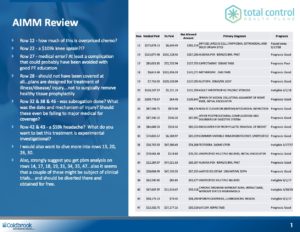
Business leaders are constantly monitoring the financial performance of their organization. If costs start to escalate in a particular area, the CEO or CFO likely dive into the numbers to find out what the root cause is. If the sales budget was out of line and a review of credit card statements showed expensive hotels and pricey client entertainment, changes would be made quickly. Why then do employers tolerate financial reports related to one of their largest expenses, their medical plan, that provide no answers?
On the right side of the image at the top of this post is a large claim report from an insurance carrier. It outlines the dollars spent associated with each claimant, provides a very general overview of the claim, and finally a basically worthless projection of what the future holds. A review of the report leaves the reader only slightly better informed than they were prior to the review. On the left side of the image is a summary of a high level review by the top medical management firm, Ault International Medical Management (AIMM). AIMM not only asks the questions that any business leader would, but they have the clinical knowledge and vast knowledge of the health care delivery system to understand if the cost is appropriate, out of line, or if it has the potential to be transferred to a more appropriate payer. Wouldn’t you want the team assembled to manage your health plan to be asking those questions? If you had a Total Control Health Plan, they would.
Employers who have implemented a TCHP have put themselves in a position to know exactly how their health plan is running and why. Ultimately each employer gets to choose how their plan is designed and how much scrutiny is applied to claims before they are paid. With the right partners the right questions can be asked and answered. With the right partners, control can be achieved. It is possible to manage a health plan like business leaders manage every other aspect of their business, if you have a Total Control Health Plan.


